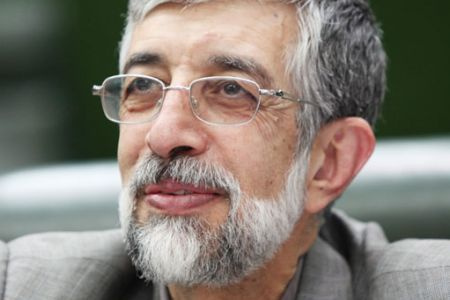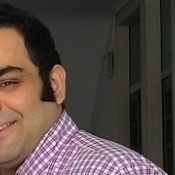Who’s Who in Iranian Politics
Gholamali Haddad Adel

Born in 1945 in Tehran, Gholamali Haddad Adel is the former speaker of Iran’s Islamic Consultative Assembly (Majlis, or Parliament), and a member of the Expediency Council of the Islamic Republic of Iran. He was the first non-cleric speaker of the Islamic Consultative Assembly.
He was also the head of Iran’s Academy of Persian Language and Literature (during which time he was elected as the speaker of the Islamic Consultative Assembly). On October 24th, 2008, he was once again appointed, by President Ahmadinejad, as the head of this cultural center. He is also a member of the High Council of the Cultural Revolution. He received the highest number of votes among candidates from Tehran to become a representative in the Majlis in early March 2010.
In 1963, he graduated from Alavi High School. He received his bachelor’s degree in physics from Tehran University in 1966, and later his master’s degree from Pahlavi University in 1968. He taught physics between 1966 and 1968 at Pahlavi University, and from 1968 to 1971 at Iran’s National University. In 1972, he received his master’s degree in philosophy from the Department of Literature and Humanitarian Sciences of Tehran University. He later finished his PhD courses in philosophy in 1974. He taught philosophy, history of science and history of western philosophy and history of Islamic philosophy at Aryamehr Technical University between 1971 and 1977. In 1985, he defended his PhD thesis, entitled “Kant’s View on Supernaturalism”. Since then, he has been teaching western philosophy at Tehran University.
On the 21st of August, 1971, when he was teaching physics at the National University, he was one of the 44 members of Iran’s Freedom Movement who, along with his brother Majid Haddad Adel, were arrested on the accusation of attempting to disrupt the celebration of the monarchy’s 2500th year, and he was imprisoned for 66 days. This group published its first statement in prison as the statement of the People’s Mujahedin Movement of Iran. After finishing their prison sentences in December of the same year, they founded the People’s Mujahedin Organization of Iran.
His wife, Tayyebeh Mahruzadeh, holds a PhD degree in philosophy of education and is an advisor to the Minister of Science, Research and Technology, and is an associate professor at Al-Zahra University. She has founded the Farhang High School for girls, specializing in humanitarian sciences, and she ran this school for several years. Farhang High School was named in 2003 as one of Iran’s top four schools. Her son-in-law is Mojtaba Khamenei (the son of Ayatollah Khamenei).
Haddad Adel was among the politicians from the Principalist faction who supported Mahmood Ahmadinejad in the last presidential election and gave a speech in the gathering of Ahmadinejad’s supporters following his election. Following the election, a special delegation was formed by Ayatollah Khamenei to investigate the complaints of the protesters. In this regard, Abassali Kadkhodaei, the speaker of the Guardian Council, had stated that considering the extra five days given by the Supreme Leader for investigation of the complaints, the Guardian Council had decided to form this special delegation.
According to his statement, the members of this special delegation included: Mr. Abu Torabi, Mr. Dorri Najafabadi, Mr. Haddad Adel, Mr. Velayati and Mr. Rahimian. Along with representatives of the presidential candidates, these members were to investigate the received complaints about the 2009 election.
Following the house arrest of Mousavi and Karoubi (presidential candidates in the 2009 election), and in response to a question based on the fact that these men were not convicted and that they might be able to run in the 2013 election, Haddad Adel said, “This is not a correct statement. They have been tried in the people’s court and there is no need for a trial. The decision to have no trial in court was the right decision.”
Haddad Adel received the highest number of votes as Tehran’s representative in the ninth parliament, but in competition with Ali Larijani, was not able to obtain enough votes from the representatives to become the speaker of the parliament. He was among the candidates who was listed in the two main lists of the Principalists for the parliamentary elections; one was the list of the United Front of Principalists led by Mahdavi Kani, the head of the Council of Experts, and the other list was that of the Resistance Front led by Ayatollah Mesbah Yazdi, one of the influential clergymen among radical Principalists. But many considered him as a candidate of the Resistance Front, whose members are former members of Ahmadinejad’s cabinet, for the position of parliament speaker.
In the upcoming 2013 presidential elections, Haddad Adel’s name has once again been proposed as a potential candidate. Along with Ali Akbar Velayati and Mohammad Bagher Ghalibaf, he has formed a coalition of Principalists and one of these three will be the final candidate of this group for the presidency, but many Principalists do not approve of this coalition.
In a gathering of Principalists in Ghazvin province, coinciding with Government Week, on August 25th, 2012, held in the Hosseiniyeh of Ayatollah Shali, Gholamali Haddad Adel stated, “If one day I feel that I have a duty to enter the presidential election, I would do so even if I knew that I would have only one vote, exactly as I did when I was nominated for the speaker of the parliament.”
In response to the question of which organizations have conducted polls about him, Mr. Ghalibaf, and Mr. Velayati, the MP stated, “The polls show that Mr. Velayati, Mr. Ghalibaf and I will have about 60 percent of the votes in the next elections, but at the moment, I will not give information about which organizations conducted these polls.”
While criticizing Haddad’s coalition with Velayati and Ghalibaf, the Resistance Front rejected this coalition and Jalali, the spokesman of the Resistance Front, said, “If an individual does not follow the Front’s policies, he will be removed from this institution.” He went on to say, “Mr. Haddad Adel has joined the 2+1 coalition which has expanded to a 4+1 coalition with the addition of Larijani and Pour-Mohammadi. This coalition could even grow to include 12 members.”
He added, “If we add a spoonful of bitter medicine to a jar of honey, the honey can no longer be consumed. In my opinion, Mr. Haddad Adel was like sweet and tasty water that entered a salty river which is no longer usable.”
The Resistance Front’s spokesman stated, “We ask these individuals to at least consider their own interests, even if they don’t consider the interests of the Islamic Republic.”
He went on to say, “Based on our contacts with the people, we can see that the 60 percent they have stated is made-up. We have to really talk to the people and get their opinions. Otherwise, we can also claim that we have 90 percent of the votes, but such a claim would be baseless.”
While stressing that the 2+1 coalition will not have a positive outcome, the head of Ayatollah Mesbah Yazdi’s office stated, “Of course, unity is always positive, but I believe that in the end such a coalition will collapse and will not achieve anything, because no suitable individual can be found in this group.”
The presidential elections will take place in June of 2013, and Haddad Adel is one of the Principalists’ main choices for these elections. However, he has many serious critics among the Principalists, and political developments on the verge of the elections are always variable, rendering any prediction impossible.


